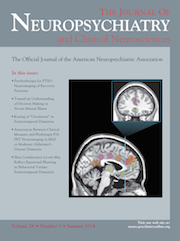To the Editor: Biochemical, pharmacological, postmortem, genetic, brain imaging, and animal studies have suggested that the GABA and benzodiazepine receptor complex play an important role in dopaminergic transmission in the brain and the pathophysiology of schizophrenia. Reduced GABA transmission or GABAergic hypofunction, in the prefrontal cortex (PFC), hippocampus, and other limbic cortical and subcortical regions, may lead to cognitive impairment including working memory deficits, poor affect regulation, and the positive symptoms of schizophrenia (delusions, hallucinations).
1–3 Case Report
A 50-year-old man was admitted to the in-patient psychiatric ward at the medical center with the following symptoms: talking to himself, poor self-care, restlessness, frequent hospital admission, and inappropriate speech. During his examination, he pounded his head, saying: “My head is like a stone,” and held his shoulder, saying: “My body is seared.” His symptoms started about 4 years ago, and prior to the onset of his somatic symptoms (within the past few months), he exhibited social withdrawal, reduced speech, nervousness, and insomnia, telling his family things such as “All of us will die,” “We will be ill,” “We will be like stones,” and “We are ill.” He spent a large sum of money going to different general medical practitioners, despite normal laboratory, radiological, and physical examinations. He had also been admitted to several psychiatric outpatient clinics, where he was treated with a variety of psychotropic drugs. Because his symptoms did not improve, he stopped these courses of treatment. His symptoms gradually became more acute. The patient has no history of substance abuse or mental disorders within the family.
An examination of his mental status revealed the following: very poor self-care; short responses to our questions; markedly reduced attention and concentration; psychomotor restlessness; talking slowly and in a low tone; poor thought content; perseverative speech, such as “My head is like a stone” and “My body is seared”; compulsive behavior; holding his shoulder; somatic delusions; dysphoric mood; situationally inappropriate smiling; lack of insight; impaired abstract thinking and social reasoning; decreased appetite; and insomnia.
The patient was given risperidone (4 mg/day) and lorazepam (2 mg/day); this treatment reduced his symptoms (psychomotor restlessness, dysphoric mood, perseverative speech, and poor self-care). After 1 week of treatment, the initial dose of lorazepam was decreased to 1 mg/day (administered every evening). Then, the dose of lorazepam was reduced; his symptoms significantly increased, especially psychomotor restlessness, psychotic symptoms, perseverative speech, somatic delusions, dysphoric mood, and holding his shoulder. At this point, he was given 1 mg of lorazepam; after about 1 hour, his complaints of psychomotor restlessness, dysphoric mood, and perseverative speech decreased. Upon repeating this reduction, we observed the same cause-and-effect relationship. The dose of risperidone was gradually increased to 8 mg/day because of the persistence of his symptoms. MRI was performed, revealing no abnormalities.
Discussion
Benzodiazepines are used when a patient with psychosis is in a very distressed and treatment-resistant schizophrenia.
1 Benzodiazepines would be expected to be useful by enhancing GABAergic function, which may be reduced in patients with schizophrenia.
4 It has been proposed that GABAergic deficits can cause an imbalance between excitatory and inhibitory neurotransmission that may be involved in the pathogenesis and symptomatology of schizophrenia.
5 In addition, a dysfunction of cortical GABAergic interneurons, which plays an important role in regulating pyramidal neuron firing rates, results in a disturbance of cortical inhibitory activity and would alter the synchronous activity in the brain, influencing the modulation of associative cortical functions that might be responsible for schizophrenia.
5,6 This case report suggests a specific relationship between clinical features of schizophrenia and reduced GABAergic transmission.

